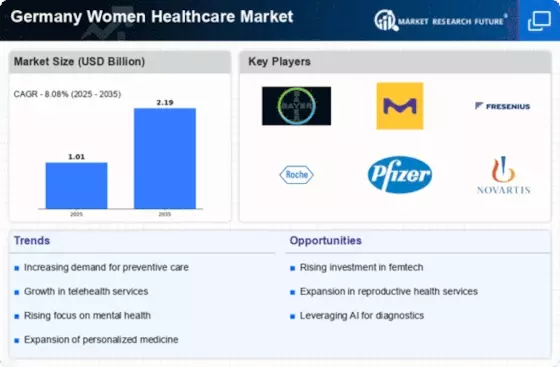Government Initiatives and Support
Government initiatives significantly influence the Global Germany Women's Healthcare Market Industry. Policies aimed at improving women's health access and affordability are being implemented across various regions. These initiatives often include funding for women's health programs, subsidies for preventive services, and public health campaigns. Such support not only enhances healthcare accessibility but also fosters a more equitable healthcare environment. As a result, the market is likely to benefit from increased investment in women's health services, contributing to its growth and sustainability in the coming years. This government backing is crucial for addressing the unique healthcare needs of women.
Focus on Mental Health and Well-being
The Global Germany Women's Healthcare Market Industry is witnessing a notable shift towards mental health and well-being. There is an increasing recognition of the importance of mental health in overall health outcomes for women. This shift is prompting healthcare providers to integrate mental health services into their offerings, thereby addressing issues such as anxiety, depression, and stress management. The growing demand for mental health support is likely to drive market expansion, as more women seek comprehensive care that encompasses both physical and mental health. This holistic approach is essential for improving the quality of life for women and enhancing healthcare outcomes.
Technological Advancements in Healthcare
Technological innovations play a pivotal role in shaping the Global Germany Women's Healthcare Market Industry. The integration of telemedicine, mobile health applications, and wearable devices has revolutionized how women access healthcare services. These advancements facilitate remote consultations, enabling women to receive timely medical advice without geographical constraints. Furthermore, the adoption of electronic health records enhances the efficiency of healthcare delivery. As the market evolves, it is anticipated that these technologies will contribute to a compound annual growth rate of 4.37% from 2025 to 2035, reflecting the increasing reliance on digital solutions in women's healthcare.
Rising Awareness of Women's Health Issues
There is a growing awareness of women's health issues within the Global Germany Women's Healthcare Market Industry. Educational campaigns and advocacy initiatives have successfully highlighted conditions such as breast cancer, reproductive health, and mental health. This heightened awareness encourages women to seek medical assistance and engage in health-promoting behaviors. Consequently, healthcare providers are responding by expanding their services to address these specific needs. The market's trajectory suggests that by 2035, it could reach 40 USD Billion, driven by the increasing recognition of the importance of women's health and the need for tailored healthcare solutions.
Increasing Demand for Preventive Healthcare
The Global Germany Women's Healthcare Market Industry experiences a notable increase in demand for preventive healthcare services. Women are increasingly prioritizing their health, leading to a surge in routine screenings and wellness check-ups. This trend is reflected in the growing number of women participating in preventive health programs, which aim to detect health issues early. As a result, the market is projected to reach 25 USD Billion in 2024, driven by a proactive approach to health management. The emphasis on preventive care not only enhances women's health outcomes but also reduces long-term healthcare costs, thereby influencing the overall market dynamics.













Leave a Comment